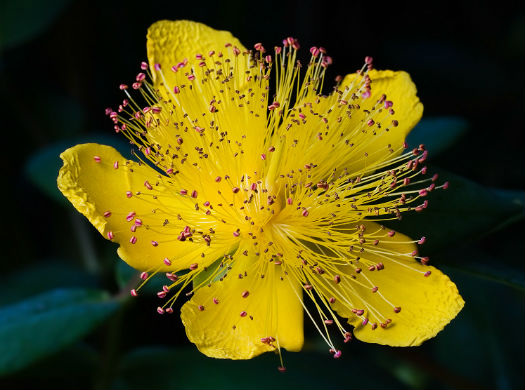
If you’re an adult in the USA there’s a 1 in 10 chance you’re going to go through a major depressive episode in the next year.
Personally, I find that kind of depressing.
To add insult to injury the U S of A is the world leader in driving people insane. Here’s a heatmap from the WHO that compares the life years taken by depression across the world:

Maybe it’s the fast food. Or the great recession. Or maybe the US collectively fosters an obsession with measuring these types of things which makes it seem worse than it really is. Or maybe it’s big pharma finding clever ways to keep moving the goal posts so more and more people can find reasons to pop pills.
But whatever the reason, it’s clear something isn’t quite right.
Why are so many people in the dumps?
Before You Scroll Any Further, Read This.
The most popular way to treat depression is with antidepressants. The current crop of drugs used are called SSRI’s, which stands for selective serotonin reuptake inhibitor. Serotonin is a “happy” chemical that’s produced in the brain and has powerful effects on your mood. Depressed people have about 2/5 the amount of circulating serotonin as non-depressed people.
Suicidal people have about 1/10 the amount of circulating serotonin as everyone else before they check out.
SSRI’s block serotonin from going back into your neurons, “forcing” it to keep circulating, where it can exert its effects on your mood.
The use of SSRI’s has increased 400% since 1988. There are many different brands but their mechanism is the same: they cause your brain to “burp” up some extra serotonin. And for people who struggle with depression that’s really useful, especially if they don’t have other means to cope with the illness.
However the use of antidepressants should come with the following caveats:
1). Depression is just as much a psychological illness as a physical one. Your brain changes its chemistry in response to its environment, and most depressed people suffer through a state called “learned helplessness” where they feel like they have no way to change the world around them and can’t solve their own problems. That’s a pretty depressing place to be in, and low levels of serotonin are just your brain responding appropriately.
2). Antidepressants can cause some unwanted side effects. ‘Nuff said.
3). They might not work any better than placebos. Depression is a funny illness because it hinges so much on your own attitude. It was accepted as dogma that SSRI’s were THE way to treat depression until some funny things happened:
- It was found that other psychotic drugs worked just as well, despite having different mechanisms.
- It was found that the experience of side effects was what really drives improvement from treatment. Depressed people feel helpless and struggle with optimism. When they take a drug and feel a side effect (loose stools, nausea, whatever) it makes them think they’re taking something that’s going to have an affect on them, and it changes their outlook. What’s funny is that the stronger the side effect, the more positive affect it has on the outcome. In randomized placebo trials the experience of side effects predicts improvement a whopping 89% of the time!
4). SSRI’s reduce your body’s ability to increase serotonin production. When you take an SSRI your body blocks serotonin from coming back into your cells that produce it, and that can create a negative feedback loop which causes your body to produce less of it, thus becoming more dependent on an anti-depressant for mood regulation.
How to Treat Depression Naturally
It should go without saying that the best way to naturally alleviate depression is to have a life that’s not depressing. Sunshine, exercise, good friends, belly laughs, financial autonomy, regular sleep, etc. I completely understand that that’s usually easier said than done. Also note that I myself do not struggle with depression. It might be nothing more than dumb luck, but I’ve never had a problem with regulating my mood.
However, many people in my family (especially the females) can’t say the same, and that’s what sparked my own curiousity into how you can use natural remedies to treat the condition.
It turns out that depressed people predictably have certain deficiencies and physiological imbalances, and there are a variety of herbs that mimic the effect of SSRI’s, some of which have clinical results that are just as effective. More on that later.
Simply getting enough of the stuff mentioned in this article won’t completely heal you from your mental illness. But it will remove the invisible foot that might be getting in your way and tripping you up while you struggle through your recovery.
Micronutrients
1). Vitamin D.
Vitamin D regulates a lot of activities within the brain and is linked to serotonin production. So it shouldn’t be surprising that vitamin D deficiency is linked to depression.
When it comes to vitamin d supplementation it’s important to keep in mind that your levels of vitamin D build up slowly so you won’t experience immediate benefits when you take it. Unlike other vitamins it’s also a steroid which means you can have too much of it just as easily as too little.
In clinical trials effective dosages are usually around 50,000 IU/week, but this probably isn’t a good idea for day-to-day use over the long run. Shooting for 2,000 IU per day is probably a better idea. If the weather’s good a 15-minute walk will suffice as long as you don’t use sunscreen, but if getting outside is an issue for you then it’s best to plan on supplementing.
Does it matter which brand you take? Not too much. Most vitamin D is in the form of D3 as cholecalciferol and this will suffice. Do not take vitamin D2 as ergocalciferol. This is the stuff that’s used to fortify milk and is different from the form that’s found in food. Neither of these are as good as the vitamin D you get from sunlight, which is vitamin D3 sulfate, which can do a lot more in your body than either D2 or D3 cholecalciferol.
Also keep in mind: In your body vitamin D never shows up to the party alone. It usually works in conjunction with vitamins A, E, and K so it’s best to take these together to get the synergistic effect.
2). Magnesium.
Magnesium works with calcium to regulate electrostatic potentials in between neurons in your brain.
If you’re deficient in magnesium the space between your neurons get “static-y” and start to misfire and stop regulating what goes on in between them. You shouldn’t have to use your imagination too much to see that a magnesium deficiency might do funny things to your mood.
Unfortunately for you, most magnesium has been stripped out of your diet. It was frequently found in drinking water, but that was removed because it causes pipes to rust. Magnesium is almost always completely removed from foods during the manufacturing process. For example, natural wheat is a good source of magnesium, but white flour only contains 16% of the wildtype amount.
When magnesium deficiency is the sole cause of depression a magnesium supplement can cure the illness in less than 7 days. In other trials 45omg of magnesium taken daily was equally as effective as imipramine (a popular anti-depressant).
In mouse studies they’ve found they can intentionally starve them of magnesium in order to create depression for future examinations.
When it comes to a magnesium supplement you should avoid your multi-vitamin. It’ll usually contain magnesium oxide, which is metallic ruffage. For the magnesium to be well absorbed it needs to be bound to a salt, such as aspartate, citrate, fumarate, malate or succinate. These pills are larger and you’ll usually have to take several to get the recommended dosage. Magnesium in salt form can’t be reduced enough in size to cram into a multi-vitamin which is why the inferior oxide form is used.
Somewhere between 200-300mg/day will probably suffice, and since magnesium salts are released slowly into the bloodstream there shouldn’t be a laxative effect.
3). B Vitamins and Folate.
Depressed people’s brains have a hard time making the “happy stuff” that puts us in a good mood like serotonin, dopamine, and norepinephrine.
The most fundamental building blocks for these chemicals are folate and B vitamins, which work together to help your body create the raw materials we need to feel like we’re on top of the world.
35% of depressed people are deficient in folate, and for people who suffer from major depression that figure is as high as 92%. Taking a folate supplement all by itself probably won’t make you feel better. In clinical trials where it has a measurable effect the dose is between 15 and 50 mg, which is an insanely high amount.
Folate also doesn’t do much without B12 to accompany it, and if you take too much of one and not the other you can actually make things worse. Vegetarians and vegans frequently have deficient levels of B12, so if you refuse to eat animal products take special notice.
A few important points about supplementation: You can take folate as folic acid, or as folate. Choose the latter. Folic acid is the cheap stuff and you can actually OD on it. Take it as l-methylfolate if possible. When it comes to vitamin B12 you’re usually faced with either cyanocobalomin or methylcobalomin. Methylcobalomin is better and a little less common.
4). Iodine
An underactive thyroid is a tell-tale sign of depression. It’s still up in the air whether or not it’s the depression or the thyroid that’s the root cause, but the two frequently go hand-in-hand.
Every hormone coming into and out of your thyroid is attached to an iodine molecule. If you don’t get enough iodine you’ll likely have an under active thyroid. Your body doesn’t make iodine on its own and therefore it needs to be acquired through your diet.
The table salt you buy at home is fortified with iodine, and if you eat at home a lot that should be enough. Salt you get at restaurants is not. Unfortunately the best dietary source of iodine is kelp…..not exactly something that’s in abundant supply or easily prepared. You can get iodine from kelp in pill form, and sometimes you can even get it as part of a multi-vitamin (Douglas Labs Preventive X being one example).
If not kelp, or some sort of kelp product (like Marine Coasts kelp flakes) fresh water seafood is your best bet.

5). Omega 3 Fatty Acids
The omega fatty acids EPA and DHA are probably the most well studied supplements for helping to regulate mood. Lots of marked up anti-depression supplements are little more than re-branded fish oil.
The collection of randomized, placebo controlled trials has safely put together a picture of omega 3’s as being able to support general mood.
There are three main types of omega 3’s you get from your diet: ALA, EPA, and DHA. ALA is the most common and is found in a wide variety of foods. Your body can convert ALA to EPA and DHA, but people have a lot of variation in how efficiently they can convert one to the other.
Despite often being lumped together, EPA and DHA serve very different functions in the body. EPA is primarily responsible for reducing inflammation within the body, whereas DHA is a major structural component of the brain itself and directly regulates a variety of processes.
In a very interesting article at OmegaVia Vin Kutty states that it’s EPA and not DHA you should focus on for regulating mood. He’s an expert on these sorts of things, but my interpretation is that the two work synergistically to regulate brain function through different channels. So I’ll say try and get 1000mg/day of both.
If you regularly eat fresh water seafood or sea vegetables then you have nothing to worry about and no need for a supplement. If you don’t then a microdistilled oil is probably a good idea.
Omegavia is good for that sort of product, and so is barlean’s omega swirl if you’re vegetarian/vegan.
6). 5-HTP
Serotonin is made from the amino acid tryptophan. For a while people had the idea that deliberately eating tryptophan would help depression but that turned out not to be true because it doesn’t actually go into the brain when you digest it.
Instead what did work is taking something called 5-HTP. Tryptophan gets turned into 5-htp before it gets turned into serotonin in the brain. Unlike tryptophan 5-htp crosses the blood-brain barrier and gooses your brain (and gut) into burping out more serotonin and makes you feel better.
In clinical trials 5-htp has shown to be more effective than placebo and frequently more effective than major antidepressants like prozac.
I’ve experimented with 5-htp on my own. It works. In fact, you’ll need to be careful if you use it because it can work a little too well. 5-htp is well known for producing side effects for people who don’t tolerate it very well, and after I took way too much of it to see how powerful it was I was experiencing an episode that was described very well by Bill Murray in What About Bob:
Dizzy spells. Nausea. Cold sweats. Hot sweats. Fever blisters. Difficulty breathing. Difficulty swallowing. Blurred vision. Involuntary trembling. Dead hands. Numb lips. Fingernail sensitivity. Pelvic discomfort. It wasn’t fun.
In his paper “Treatment for Therapy Resistant Depression“Professor Kielholz states it nicely:
5-HTP merits a place in the front ranks of antidepressants instead of being used as a last resort. I have never in 20 years used an agent thatt (1). was effetive so quickly; (2) restored patients so completely to the persons they had been and their partners had known; and (3) was so entirely without side effects.
5-htp has outperformed popular medications. It’s been shown to help people who were previously resistant to treatment, and is fairly inexpensive.
Even better, it might augment the effects of popular drugs. Many SSRI’s deplete your reservoirs of serotonin, whereas 5-htp gives your body more substrate to keep making more of it.
It’s just important to not to go overboard with it like I did. (If you’re curious I took a little more than 500mg of a highly purified extract). In smaller doses I was fine. In most trials something between 100-300 mg is effective and safe., and most of the capsules you can buy are somewhere between 50-200mg.
7). Creatine
Creatine is marketed to gym rats who want to improve their workouts, but its usefulness is more widespread and is much more benign than commonly perceived.
It does help you if you want to improve your lifts, but the truth is practically anyone can safely take creatine and get some benefit from it. When your body exerts energy it does so by turning the molecule ATP into ADP. The difference between these two is a phosphate group, which creatine supplies.
That’s really handy when you’re at the end of a set and need some extra “oomph” to finish your rep. But creatine is used wherever energy is utilized.
And do you want to know what organ really sucks up energy? Your brain. Most of the time it accounts for 20% of your energy needs. It’s a vacuum for glucose and ketone bodies.
Not surprisingly, people with mood disorders have low levels of creatine. And preliminary studies suggest adding creatine improves depression, especially in women, who typically have lower creatine levels than men.
And it’s also safe. There are no known adverse side effects to creatine consumption and your body safely disposes of extra that it doesn’t need.
Your body makes creatine on its own, but only enough to avoid deficiency. The only dietary source of creatine is meat. If you’re a frequent carnivore then there’s no need to take extra. If you’re a vegetarian and/or female then it might be a good idea to include it in your effort to fight the blues.
8). Zinc
Zinc deficiency can be a decent indicator of depression, and depressed people who are deficient in zinc get better when they take it.
Your body doesn’t store zinc so you have to keep replenishing your stores of it. It’s commonly found in seafood and some vegetables.
Like magnesium, there’s a form of zinc that’s nothing but ruffage and a form that your body can actually use. Stay away from zinc oxide and instead go with zinc gluconate or zinc chelate.
Herbal Extracts
The latter group of nutrients represent the root causes of why your body can’t make itself feel better.
Here are herbs that can alleviate some of the symptoms.
9). St. John’s Wort
In the 90’s St. John’s Wort TOOK OVER THE NATION with its claims of treating depression better than prozac and anything else big pharma could come up with. It was on 60 minutes. It was on the cover of Red Book. In Germany physicians collectively gave the middle finger to traditional medicine in order to prescribe it more.
IT COULD NOT BE STOPPED.
Then the tide began to turn when an article on the cover of Time magezine titled St. John’s What? showed up and stated that it did no better than Placebo.
As it turns out, the study cited by Time was a little unfair. It only treated patients with severe depression, did not have a comparison to other antidepressants, and coincidentally enough, was sponsored by Pfizer, the maker of Zoloft.
Subsequent studies found that in patients with moderate depression it performed just as well as Zoloft. Other studies here and here.
The Cochrane foundation also did a meta-analysis and found that when you sum up all of what’s been studied of St. John’s Wort, it really is effective at treating the symptoms of depressed people, with clinically effective doses being somewhere between 500 and 1200 mg.
10). Saffron
In addition to being the world’s most expensive spice and a staple of high-falutin’ cousine, saffron is also a clinically proven treatment for mild depression.
It comes from the middle east, where it’s most commonly used and most extensively studied. Saffron has a folkloric reputation for being able to improve the mood, and it’s clinically effective even at very small doses. In 15 mg doses it was more effective than Prozac when taken for 8 weeks.
The only drawback to using saffron is its price. It can’t be mechanically grown so the only way to get it is by having someone, somewhere handpick it and get it ready for use.
That means your wallet might get stretched a little thin if you want to get your hands on some. Making the matter worse is that saffron petal extract is not used very commonly in the US as a supplement, so there’s just not a very deep market out there for someone curious to try it.
But it does work.
Other Stuff That Might Sound Like A Good Idea, But Maybe Isn’t
Lots of supplements aimed at alleviating mood will contains things like GABA, L-Theanine, L-Tyrosine, Holy Basil, Lemon Balm or Ginkgo biloba.
These either just treat the symptoms or have very thin evidence supporting their anti-depressant claims. Therapeutic nutrition should primarily be directed towards fixing the underlying causes of depression, and treating its symptoms.
If you stick to what’s provided in this list you don’t need any of the stuff just mentioned.
Reference Table
Here’s a table that summarizes the info talked about in this article.
[table id=16 /]
Hope this helps. Have a nice day!
References
E.S., Rebecca. “Vitamin D deficiency and depression in adults: systematic review and meta-analysis.” http://bjp.rcpsych.org/content/202/2/100.short
Eby, George. “Rapid Recovery from Depression Using Magnesium Treatment.” http://www.sciencedirect.com/science/article/pii/S0306987706001034
Thornton, WE. “Geriatric Mental Function and Serum Folate: A Review and Survey.” http://www.ncbi.nlm.nih.gov/pubmed/887975
PY, Lin, et. al. “A meta-analytic review of double-blind, placebo-controlled trials of antidepressant efficacy of omega-3 fatty acids” http://www.ncbi.nlm.nih.gov/pubmed/17685742
Turner, Erick, et. al. “Serotonin a la carte: Supplementation with the serotonin precursor 5-hydroxytryptophan” http://www.sciencedirect.com/science/article/pii/S016372580500135X
Kato, T, et. al. “Brain phosphorous metabolism in depressive disorders detected by phosphorus-31 magnetic resonance spectroscopy.” http://www.ncbi.nlm.nih.gov/pubmed/1479134
E Ranjbar, et. al. “Effects of zinc supplementation in patients with major depression: a randomized clinical trial.” http://www.ncbi.nlm.nih.gov/pubmed/24130605
Cochrane Foundation. St John’s Wort for Treating Depression. http://summaries.cochrane.org/CD000448/DEPRESSN_st.-johns-wort-for-treating-depression.
Akhondzadeh Basti A, et. al. “Comparison of petal of Crocus sativus L. and fluoxetine in the treatment of depressed outpatients: a pilot double-blind randomized trial.” http://www.ncbi.nlm.nih.gov/pubmed/17174460




Jonathan is there a supplement that combines all of these?
LikeLike
Jesse,
Not that I know of. The closest supplement I’ve seen is Mood Support by NOW Foods: http://www.amazon.com/Now-Foods-Support-Veg-capsules-90-Count/dp/B000TD0PXU
Most mood support supplements are mishmashes of GABA, L-Theanine, 5-HTP, etc, but none of them really *nail* it.
LikeLike
Great article. My mother’s used St. John’s for a long time and it’s always helped her out. D is really important too. Morning walks do great things for your mood.
You didn’t mention this in your article but light therapy works really well too. Artificial light can change your circadian rhythm’s and make it harder to sleep and sleep is really important for managing depression.
LikeLike
[…] Its formulation starts with clinical research on what ingredients actually move the needle for helping people alleviate depression and anxiety, and works backwards from there. A lot of the specifics are covered in a previous post I’ve written on the topic. […]
LikeLike
[…] And as I’ve written before, people who struggle with mental health predictably have certain nutrient deficiencies that can be corrected. […]
LikeLike
I wish I could narrow this list down to just one or two main solutions and skip all the others because of the cost and the amount of time it’s going to take for me to experiment regarding which one actually works and which one doesn’t do anything at all. I similarly have unipolar depression but there are many different kinds or ways to categorize it, though, so I’m never fully sure what depression I have but I do know I have a disorder because of the lifelong everpresent fatigue, the mood swings, the cyclical negative thoughts that get more and more severe if nothing is done to stop them, irregular sleep cycles, unwanted crazy thoughts, addiction issues, insecurity or paranoia, I know I have some form of this disorder because it came back, immediately, after I stopped taking antidepressants after using them for 20 years.
But the antidepressants took away my joy and happiness as well so I’m not doing them anymore.
Good article and suggestions, though.
LikeLike
A good starting point would be vitamin D and a methylfolate/methylcobalamin/pyridoxal-5-phosphate vitamin. These are both basic nutrients that won’t do any harm and very good building blocks to shore up any microdeficiences which might be contributing to your condition.
LikeLike
Ive read elsewhere of dangers of developing serotonin syndrome from combining 5htp with st johns wart. Just curious if there are any other dangers of mixing 5htp with the other supplements on this list?
LikeLike
Max,
It’s good to only use one serotonin booster at a time. Taking a variety of supplements that do the same thing should be avoided.
LikeLike
Do you recommend trying all of these at once or just one/a few at a time? If just one/a few at a time, do you then continue to add more on top of the ones you started or give each one so long of a try before discontinuing it’s use if no benefits are noticed?
Thanks
LikeLike
Also, should you continue with a multivitamin if trying the above suggestions or put it aside for a bit?
Thanks again,
Mike
LikeLike